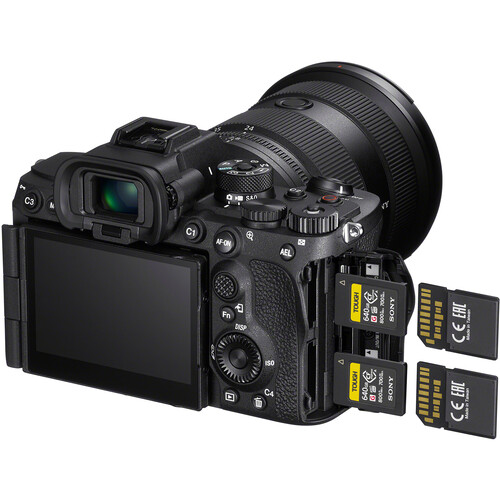Perfect for New Photographers and Content Creators
Introduction
Beginner cameras in 2025 blend affordability with advanced tech like AI autofocus, 4K+ video, and compact designs. Whether you’re into vlogging, travel, or film-style photography, this guide covers the top 8 models for starters in the US and UK.
Suggested Image: A hero banner with a collage of all 8 cameras.
Image Source Tip: Use high-res product shots from manufacturers’ websites or stock libraries like Shutterstock.
Top 8 Beginner Cameras for 2025
1. Canon EOS R100

Price: $699 (US) / £649 (UK)
Sensor: 24.2MP APS-C
Lens Mount: Canon RF
Best For: Hybrid shooters (stills + video).
Key Features
- Guided UI: Step-by-step tutorials for settings like aperture and shutter speed.
- 4K 30p Video: Crisp footage with Dual Pixel CMOS AF II for smooth tracking.
- Portable Design: Weighs just 1.2 lbs (540g), ideal for travel.
Pros:
- Intuitive touchscreen for beginners.
- Future-proof RF mount (lens lineup expands in 2025).
Cons:
- Limited RF-S lenses at launch (stick with kit lens or adapt EF glass).
Why Buy?
A no-fuss mirrorless camera for those transitioning from smartphones.
2. Nikon Z30 Mark II

Price: $799 / £749
Sensor: 20.9MP APS-C
Lens Mount: Nikon Z
Best For: Vloggers and streamers.
Key Features
- Flip-Out Screen: Perfect for framing yourself while filming.
- 4K 60p Video: Ultra-smooth footage with Eye-Detection AF for humans and pets.
- USB-C Livestreaming: Go live on YouTube/Twitch without a capture card.
Pros:
- Sleek, lightweight body (1.1 lbs / 500g).
- Strong low-light performance up to ISO 51200.
Cons:
- No EVF (rely on the rear screen).
Why Buy?
Nikon’s answer to Sony’s ZV series, with better ergonomics.
3. Sony ZV-E20

Price: $899 / £829
Sensor: 26MP APS-C
Lens Mount: Sony E
Best For: YouTube creators.
Key Features
- AI Real-Time Tracking: Locks onto faces, eyes, or objects effortlessly.
- 4K 120p Slow-Mo: Capture cinematic B-roll in S-Cinetone color.
- Background Defocus Button: Blur backgrounds instantly for pro-looking shots.
Pros:
- Best-in-class autofocus for video.
- Compact and travel-ready.
Cons:
- Mediocre battery life (350 shots per charge).
Why Buy?
A content creation powerhouse with AI smarts.
4. Fujifilm X-T40

Price: $1,199 / £1,099
Sensor: 26.1MP X-Trans APS-C
Lens Mount: Fujifilm X
Best For: Film photography enthusiasts.
Key Features
- Classic Film Simulations: Nostalgic Neg, Classic Chrome, and Acros presets.
- 6.2K 30p Video: Shoot oversampled 4K for sharper footage.
- Weather Resistance: Dust- and splash-proof for outdoor shoots.
Pros:
- Stunning JPEGs straight from the camera.
- Retro dials for manual control lovers.
Cons:
- Steeper learning curve for newbies.
Why Buy?
For those who want analog charm with modern tech.
5. OM System OM-5 Mark II

Price: $999 / £899
Sensor: 20MP Micro Four Thirds
Lens Mount: MFT
Best For: Adventure and travel.
Key Features
- 7.5-Stop Stabilization: Shoot handheld in low light without a tripod.
- Handheld High-Res Mode: 50MP shots from pixel-shifting tech.
- Pro Capture Mode: Never miss a shot with pre-shot buffering.
Pros:
- Rugged, freeze-proof build.
- Ultra-portable with tiny MFT lenses.
Cons:
- Smaller sensor struggles in extreme dynamic range scenarios.
Why Buy?
A go-anywhere camera for hikers and explorers.
6. Panasonic Lumix G110

Price: $749 / £699
Sensor: 20.3MP Micro Four Thirds
Lens Mount: MFT
Best For: Budget live streaming.
Key Features
- OZO Audio: 360-degree spatial sound by Nokia.
- 4K V-LogL: Flat color profile for advanced video editing.
- External Mic Support: Improve audio with shotgun mics.
Pros:
- Flip-out screen for solo creators.
- Affordable entry into the MFT ecosystem.
Cons:
- Autofocus hunts in low light.
Why Buy?
A streaming-ready camera under $800.
7. Sony ZV-1 Mark III

Price: $999 / £899
Sensor: 1-inch 20.1MP
Lens: Fixed 24-70mm f/1.8-2.8
Best For: Pocket-sized portability.
Key Features
- Advanced Eye AF: Tracks subjects even when they turn away.
- 4K 60p Video: Crisp footage with minimal overheating.
- Real-Time Streaming: HDMI output for clean feeds.
Pros:
- Fits in a jacket pocket.
- Bright aperture for creamy bokeh.
Cons:
- No lens flexibility (fixed zoom).
Why Buy?
Ideal for influencers who prioritize portability.
8. Nikon Z50 II

Price: $849 / £799
Sensor: 21MP APS-C
Lens Mount: Nikon Z
Best For: Social media multitaskers.
Key Features
- 180° Tilting Screen: Perfect for Instagram selfies.
- 4K 60p + 120fps Slow-Mo: Versatile video specs.
- SnapBridge App: Transfer photos to your phone instantly.
Pros:
- Ergonomic grip for all-day shooting.
- Balanced stills/video performance.
Cons:
- Limited Z DX lenses (adapt F-mount via FTZ).
Why Buy?
A social media Swiss Army knife.
Comparison Table
| Camera | Price (USD/GBP) | Sensor | Video | Best For |
|---|---|---|---|---|
| Canon EOS R100 | $699 / £649 | APS-C | 4K 30p | Hybrid beginners |
| Nikon Z30 Mark II | $799 / £749 | APS-C | 4K 60p | Vlogging |
| Sony ZV-E20 | $899 / £829 | APS-C | 4K 120p | YouTube creators |
| Fujifilm X-T40 | $1,199 / £1,099 | APS-C | 6.2K 30p | Film enthusiasts |
| OM System OM-5 II | $999 / £899 | MFT | 4K 60p | Travel |
| Panasonic Lumix G110 | $749 / £699 | MFT | 4K 30p | Budget streaming |
| Sony ZV-1 Mark III | $999 / £899 | 1-inch | 4K 60p | Portability |
| Nikon Z50 II | $849 / £799 | APS-C | 4K 60p | Social media |
Suggested Image: A side-by-side chart comparing specs.
Buying Guide for Beginners
1. Choose Your Sensor Size
- APS-C: Best balance of size and quality (e.g., Canon R100).
- MFT: Smaller, lighter, but lower light performance (e.g., OM-5 II).
- 1-inch: Ultra-compact but limited dynamic range (e.g., Sony ZV-1 III).
2. Prioritize Lenses
Stick with brands offering affordable beginner lenses:
- Canon RF-S (e.g., RF 18-45mm kit lens).
- Sony E-mount (e.g., Sigma 16mm f/1.4).
3. Future-Proof Your Gear
- Invest in mirrorless (DSLRs are phased out by 2025).
- Check for firmware updates (e.g., Fujifilm’s frequent upgrades)

